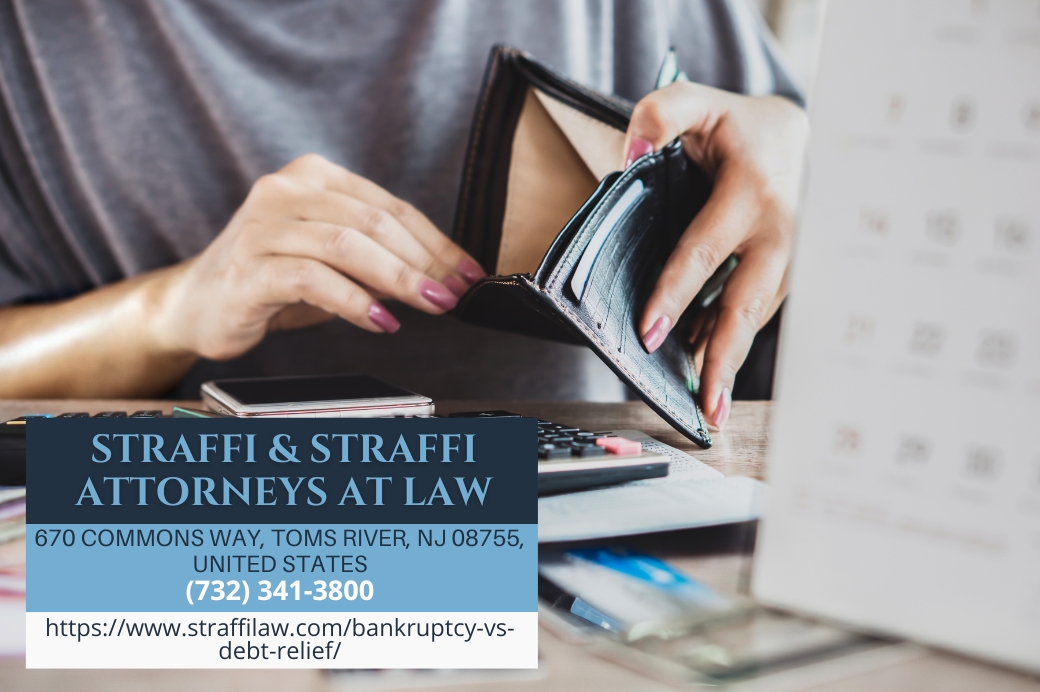Financial News
New Jersey Bankruptcy Lawyer Daniel Straffi Releases Insightful Article on Choosing Between Bankruptcy and Debt Relief
Facing overwhelming debt is a daunting experience, and individuals struggling with financial distress often find themselves at a crossroads between two potential solutions: bankruptcy and debt relief. New Jersey bankruptcy lawyer Daniel Straffi (https://www.straffilaw.com/bankruptcy-vs-debt-relief/), of Straffi & Straffi Attorneys at Law, offers crucial insights into the advantages and drawbacks of each option. Deciding the right path to take can be overwhelming, but understanding these two distinct approaches can help individuals make informed decisions.
As a New Jersey bankruptcy lawyer, Daniel Straffi explains that bankruptcy provides a legal mechanism to discharge or reorganize debt through processes such as Chapter 7 or Chapter 13 bankruptcy. While this offers a fresh start, the consequences on credit and personal assets can be substantial. On the other hand, debt relief options, such as debt management programs, debt consolidation loans, or debt settlement, focus on restructuring debt in ways that minimize credit damage and help preserve assets.
Choosing between bankruptcy and debt relief is a significant decision. New Jersey bankruptcy lawyer Daniel Straffi emphasizes that understanding the nuances between these options is crucial for those looking to regain financial stability. Bankruptcy is a legal proceeding, and while it can wipe out most debts, its long-term impact on credit can make it difficult to obtain loans, secure housing, or even find employment. In contrast, debt relief is typically less damaging to credit, though it often involves negotiating with creditors and may take years to resolve fully.
"Bankruptcy and debt relief both offer pathways to financial recovery, but the right option depends on an individual’s specific financial situation, their goals, and their long-term plans," said Daniel Straffi. "It’s important to weigh the benefits and potential consequences of each option before making a decision that could affect your financial future for years to come."
Bankruptcy is often viewed as a last resort for individuals who are unable to repay their debts. In New Jersey, Chapter 7 and Chapter 13 are the most common types of bankruptcy available to individuals. Chapter 7, also known as liquidation bankruptcy, involves the sale of non-exempt assets, such as a second home or valuable collections, to pay off creditors. It’s designed for individuals who lack the financial means to repay their debts and need a fresh start. However, filing for Chapter 7 bankruptcy comes with significant consequences, including a ten-year impact on one's credit report and the potential loss of valuable property.
Alternatively, Chapter 13 bankruptcy allows individuals to restructure their debt into a repayment plan that lasts between three to five years. This option is particularly appealing to those with a steady income who want to retain their property.
Debt relief, unlike bankruptcy, is often viewed as a less drastic and less damaging option for managing financial distress. New Jersey residents have several debt relief options available to them, including debt management programs, debt consolidation loans, and debt settlement. Each option offers a different method of restructuring or reducing debt, but they also come with their own set of advantages and disadvantages.
Debt management programs allow individuals to work with credit counseling agencies to consolidate their payments into a single monthly amount, which is then distributed to creditors. This approach can often result in lower interest rates and simplified budgeting. Debt consolidation loans, on the other hand, combine multiple debts into one loan, ideally with a lower interest rate, allowing individuals to pay off their debt more efficiently. Finally, debt settlement involves negotiating with creditors to reduce the total amount owed, often in exchange for a lump-sum payment. While debt relief can offer a viable alternative to bankruptcy, Daniel Straffi warns that it can take several years to complete these programs, and creditors are not always willing to negotiate.
“Debt relief is a great option for individuals who want to avoid the severe impact bankruptcy has on their credit,” says Straffi. “However, it’s important to be aware of the time commitment and the potential risks involved, such as fees and tax implications from forgiven debt.”
Navigating bankruptcy and debt relief is not something individuals should face alone. Daniel Straffi and the team at Straffi & Straffi Attorneys at Law are dedicated to helping clients make informed decisions that will pave the way for a more stable financial future. For those struggling with overwhelming debt, consulting a knowledgeable New Jersey bankruptcy lawyer can provide the clarity and direction needed to move forward.
About Straffi & Straffi Attorneys at Law:
Straffi & Straffi Attorneys at Law, based in New Jersey, is a law firm dedicated to providing legal guidance in the area of bankruptcy. With years of experience, Daniel Straffi leads the firm’s efforts to help individuals navigate financial distress and take the necessary steps toward a fresh start.
Embeds:
Youtube Video: https://www.youtube.com/watch?v=4b9NnKDJVbg
GMB: https://www.google.com/maps?cid=18340758732161592314
Email and website
Email: familyclient@straffilaw.com
Website: https://www.straffilaw.com/
Media Contact
Company Name: Straffi & Straffi Attorneys at Law
Contact Person: Daniel Straffi
Email: Send Email
Phone: (732) 341-3800
Address:670 Commons Way
City: Toms River
State: New Jersey 08755
Country: United States
Website: https://www.straffilaw.com/
Stock quotes supplied by Barchart
Quotes delayed at least 20 minutes.
By accessing this page, you agree to the following
Privacy Policy and Terms and Conditions.




